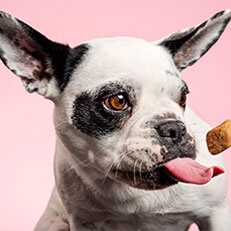
What Your Puppy Really Needs – Beyond Food and Toys
We often ask: “Do I have everything my puppy needs?”

A bed? Check. Toys? Check. The right food? Check. But what about their mind? Their heart?
Their early emotional development?
Raising a puppy is not just about keeping them fed, walked, and vaccinated. It’s about
shaping a balanced, confident dog who will thrive in a human world full of strange smells,
loud noises, and confusing rules.
Between 8 weeks and around 6–8 months of age, your puppy goes through critical
neurological and psychological development stages. And this is the time when they need
more than just kibble.
1. Mental stimulation – because boredom is the enemy
Puppies are wired to explore, sniff, bite, bark, and learn. They are learning all the time – so the
real question is: What are they learning from their environment?
Enriching your puppy’s brain prevents frustration and early behavioural issues. As Dr Ian
Dunbar, renowned veterinary behaviourist, puts it:
“A well-socialised and mentally stimulated puppy is a well-adjusted adult dog.”
(Dunbar, 2004, Sirius Dog Training)
Try:
• Simple obedience games: sit, down, touch, stay
• Nose work: treat trails, snuffle mats
• Puzzle feeders and ‘find the toy’ games
• Let them problem-solve. Let them think.
2. Safe, positive socialisation – quality over quantity
The sensitive period for socialisation (roughly 3 to 16 weeks of age) is when puppies are most
open to new experiences. But good socialisation isn’t about exposing your puppy to the
world – it’s about creating positive associations with it.
They should meet:
• A variety of humans (in hats, with beards, loud, quiet, different ages).
• Calm, well-balanced dogs.
• Different surfaces, sounds, objects, smells.
Every experience must be safe and predictable – because negative encounters can have
lasting consequences. According to the American Veterinary Society of Animal Behavior
(AVSAB):
“Behavioural issues, not infectious diseases, are the number one cause of death in dogs under
three years of age.”
(AVSAB Position Statement, 2008)
This makes early socialisation not just important – but lifesaving.
A mentor dog makes a difference
In our individual socialisation sessions, your puppy is gently introduced to a calm, stable
adult dog, who acts as a mentor. This older dog models calm responses, healthy boundaries,
and dog-dog communication skills.
Research from the University of Bristol’s School of Veterinary Sciences confirms:
“Young dogs learn more appropriate social behaviours when introduced to older, socially
mature dogs in a controlled setting.”
(Westgarth et al., 2010)
It’s a bit like letting your child play with a kind, confident older cousin – they pick up
emotional cues, manners, and courage.
These one-to-one sessions are slow, quiet, and respectful of your puppy’s pace.
3. Gentle handling and body confidence
Start early. Vet visits and grooming won’t be stressful if your puppy is used to being touched.
• Touch ears, paws, belly – then treat.
• Brush gently. Reward calm.
• Lift, hold, dry with towels – always paired with praise and food.
This builds trust and reduces fear-based behaviours later on.
4. Freedom – with safe boundaries
Puppies need structure – but they also need space to be dogs. Exploring is how they
understand their world.
• Let them sniff. Let them dig.
• Use long lines for safe roaming.
• Say “yes” more often than “no”.
Confidence grows from having the freedom to try, fail, and try again.
5. Your calm presence
No one replaces you. You are their source of safety and their biggest role model. Your voice,
your patience, your consistency – that’s what shapes your puppy’s emotional foundation.
Talk to them. Play. Be silly. Build the bond.
Want support during this crucial stage?
We offer 1:1 puppy socialisation sessions designed around your dog’s temperament and
needs. Your puppy will be gently guided through early learning, enriched play, and calm
interaction with a stable adult dog. It’s not a group class. It’s a tailored experience.
Because what your puppy really needs…
is understanding, guidance, and a bit of gentle dog-to-dog wisdom.
Sources:
• AVSAB Position Statement on Puppy Socialisation, 2008
• Dunbar, I. (2004). Before & After Getting Your Puppy. New World Library.
• Westgarth C. et al. (2010). Puppy socialisation: exposure to dogs and people and
behaviour problems in adulthood. University of Bristol.
• Seksel, K. (2009). Developmental Stages of the Puppy. Australian Veterinary Journal.





